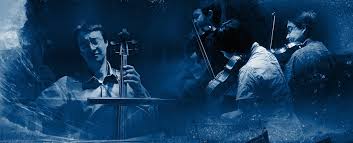Jerwood Gallery, Hastings, Friday 11 March 2017
A new orchestra in a new music venue, with an adventurous approach to programming. As we entered the Jerwood Gallery, we were gently engulfed in the sound of the sea breaking against the shore, and this image was to stay with us throughout the evening. Rather than simply play through works by Debussy and Britten, sandwiching the new pieces in between – as would have been the conventional approach – we were given a sequence of musical events which flowed effortlessly into each other.
The first half opened with the first of five interludes based on lines from Sea Fever, specially composed for the event by Steffan Rees. The setting for two cellos reflected on grey mist on the sea’s face before a seamless transition into Dawn and Sunday Morning from Britten’s Four Sea Interludes from Peter Grimes. What was immediately obvious was that, while we were seeing a chamber orchestra, the sound within the close acoustic of the Jerwood was wonderfully immediate, with the rolling brass and bell for Sunday morning ringing out with spectacular effect.
The second new interlude, the wind’s song, seemed to take up the emotional intensity of the Britten and extend it, drawing on the same tonal palette. On paper a transition at this point to Debussy might look difficult but the hushed opening of La Mer was given great clarity, with nuanced playing from the harp. It was easy to see the connection then to the flung spray and the blown spume with its energetic forces and brittle edges, calming eventually back to the warmth of the cellos.
Moonlight brought the first half to a conclusion but even the interval had something different to offer in the form of a new cocktail. In keeping with the sea theme, our glasses had samphire rather than lemon and the subtle saltiness was remarkably effective.
There was a romantic intensity to a grey dawn breaking, as we returned, before the second part of La Mer and the Storm sequence from Peter Grimes. The intensity of attack here was shattering given the confined space and precision of the playing. Steffan Rees’ final interlude the lonely sea and the sky served as a bridge to the concluding item, with a gentler opening giving way to a full romantic – almost Mahlerian – enthusiasm. The third part of La Mer brought the evening to a close and a heartfelt desire that this should not be the only occasion that we are able to hear the Arensky Chamber Orchestra.
The Jerwood proved itself to be a valuable performing space for smaller ensembles, though the limited audience capacity will always be a problem without significant subsidy if prices are not to be outside of the reach of normal concert goers. Let us hope that the quality of this event enables the support for the orchestra to continue – Will Kunhardt and his young musicians certainly deserve it.

